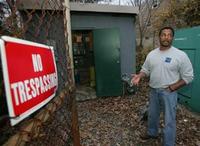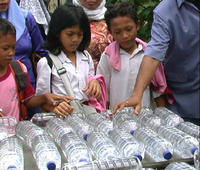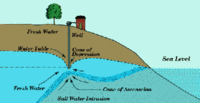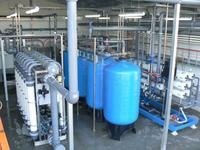-
Protecting U.S. water supplies

Aside from possible cyberatacks on water utilities, security officials are worried that terrorists could contaminate water supplies with volatile chemicals that can poison thousands of individuals and even cause explosions; DHS warned local water utilities of “backpressure” — a simple tactic terrorists could use to introduce a chemical or biological agent into the water supply and spread it over long distances without immediate detection
-
-
DHS investigates attacks on New Jersey water supply

DHS agents and local authorities in New Jersey are investigating a series of attacks on the West Milford water system; since July there have been more than fifteen attacks on local water and sewage facilities that in some instances have resulted in sewage flooding the street or losses in service all together
-
-
Solar UV disinfects drinking water

More than 800 million people around the world lack access to clean water; the water available for people to drink in many developing countries has not been treated to remove contaminants, including pathogenic microorganisms; half of the world’s hospital beds are occupied by people who are sickened by the water they drink; Purdue University researchers have invented a water-disinfection system that uses the sun’s ultraviolet radiation to inactivate waterborne pathogens
-
-
Global water market could hit $800 billion by 2035
Analysts are predicting that the global market for water could grow dramatically over the next two decades, with some projecting a $1 trillion market in 2020; “Water is the fastest growing market at the moment, with a size of $500 billion globally,” said Harri Kerminen, the president and CEO of Finnish chemical firm Kemira
-
-
Maintaining water quality
Scientists at Kansas State University and seven other collaborating institutions were recently awarded $3.3 million from the National Science Foundation (NSF) to conduct a-large scale study of how stream organisms influence water quality across North America
-
-
Cyber attacks on U.S. are becoming more lethal
The head of the U.S. Cyber Command said that cyber attacks on the United States are escalating from large-scale theft and disruption of computer operations to more lethal attacks that destroy systems and physical equipment
-
-
Saltwater intrusion threatens South Florida’s water supplies

South Florida’s water supply is becoming increasingly endangered by saltwater that is steadily seeping in from the ocean and contaminating supplies; despite the best efforts of local communities to stop the problem, saltwater intrusion is spreading
-
-
AI helps identify leaky pipes, prevent flooding
Engineers have pioneered new methods for detecting leaky pipes and identifying flood risks with technologies normally used for computer game graphics and Artificial Intelligence; these techniques could help to identify water supply and flooding problems more quickly than ever before
-
-
Wastewater recycling adds to greenhouse gas emissions

New research shows that wastewater recycling processes may generate more greenhouse gases than traditional water-treatment processes; still, there are good reasons to continue keep wastewater recycling among the water-resource tools for urban areas
-
-
Bacteria--Energy Producers of the Future?
A lot of the water we use daily goes to waste — whether it goes down drains, sewers, or toilets, much of it ends up at a wastewater treatment plant where it undergoes rigorous cleaning before it flows back to the environment; researchers are looking at processes which would turn wastewater into energy
-
-
New desalination technology to help solve world's water shortage

Over one-third of the world’s population already lives in areas struggling to keep up with the demand for fresh water. By 2025, that number will nearly double; a new study argues that seawater desalination should play an important role in helping combat worldwide fresh water shortages once conservation, reuse, and other methods have been exhausted
-
-
Protecting water utilities from terrorist attacks and contaminants
In 1993, a cryptosporidiosis outbreak in Milwaukee contaminated the city’s water supplies, hastened the deaths of dozens of citizens, made more than 400,000 residents ill, and cost more than $96 million in medical expenses and lost productivity; Sandia’s CANARY software protects water utilities from terrorist attacks and contaminants
-
-
Water purification unit generates its own energy
A new biological water purification facility developed by Siemens generates enough methane gas to power its own operations; it also produces much less sludge than conventional systems; the test facility is mlocated in Singapore, and the city state is building a much larger pilot facility — one that will process 300 times more effluent than its predecessor, or about as much sewage water as is produced by around 1,000 people
-
-
Pakistan charges India with "water terrorism"
India is building dams on three major rivers flowing from the India to Pakistan; an editorial in a leading Pakistani newspaper says that India’s goal is “[to make] Pakistan totally barren,” and that India’s actions amount to water terrorism
-
-
Former world leaders say global water crisis must be addressed
In March 2008, the U.K. intelligence services, in a report to then-prime minister Gordon Brown, warned that the deteriorating fresh water situation around the world would soon lead not only to tensions over water between states, but to “water wars”; world leaders, at least former world leaders, agree that the global water situation is dire, and twenty of them, led by Bill Clinton, meet to discuss solutions
-
- All
- Regional
- Water
- Biometrics
- Borders/Immig
- Business
- Cybersecurity
- Detection
- Disasters
- Government
- Infrastructure
- International
- Public health
- Public Safety
- Communication interoperabillity
- Emergency services
- Emergency medical services
- Fire
- First response
- IEDs
- Law Enforcement
- Law Enforcement Technology
- Military technology
- Nonlethal weapons
- Nuclear weapons
- Personal protection equipment
- Police
- Notification /alert systems
- Situational awareness
- Weapons systems
- Sci-Tech
- Sector Reports
- Surveillance
- Transportation
Advertising & Marketing: advertise@newswirepubs.com
Editorial: editor@newswirepubs.com
General: info@newswirepubs.com
2010-2011 © News Wire Publications, LLC News Wire Publications, LLC
220 Old Country Road | Suite 200 | Mineola | New York | 11501
Permissions and Policies
Editorial: editor@newswirepubs.com
General: info@newswirepubs.com
2010-2011 © News Wire Publications, LLC News Wire Publications, LLC
220 Old Country Road | Suite 200 | Mineola | New York | 11501
Permissions and Policies
